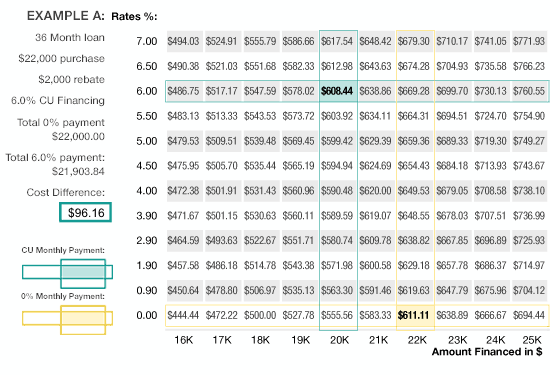The assignee has a lien on the car and can reclaim if you don't pay. Co-signer A co-signer is a personsuch as a moms and dad, close relative, or friendwho pledges to repay the loan if you do not. This can be an advantage both to you and your lender. A co-signer takes complete responsibility to repay the loan. Having a co-signer on your loan provides your lending institution extra guarantee that the loan will be paid back. If you do not repay your loan, your co-signer will be responsible for repayment even if the co-signer never ever drove your lorry. If you've been asked to co-sign a loan, you ought to think about how it will affect your financial resources. In some states, the law allows the financial institution to repossess your car without going to court. For additional information, consisting of meanings of typical terms used when financing or leasing a vehicle, read "Understanding Lorry Financing," collectively prepared by the American Financial Solutions Association Education Foundation, the National Automobile Dealers Association, and the FTC. To order print copies of "Comprehending Automobile Funding," call the AFSA Education Structure: (888) 400-7577.
A financing charge is an expense imposed on a customer for acquiring credit. Financing charges include interest on financial obligation balances and any additional costs imposed by the credit-issuing entity. Below, you'll discover typical examples of finance charges that customers face, and some suggestions for reducing the effect of these charges. A finance charge is any cost a customer encounters in the process of acquiring credit and repaying financial obligation. Financing charges normally included any kind of credit, whether it's a credit card, a business loan, or a mortgage. Any amount you pay beyond the quantity you borrowed is a financing charge.

One of the perks of having a credit card is that you can obtain cash without needing to pay off your balance completely on a monthly basis. However, taking your time to repay your debt comes at a cost. Your issuer will charge interest on any balance not settled by the end of the month. That interest cost is a finance charge. If you miss out on a minimum payment deadline that falls beyond a grace period for your credit card, you could wesley company be charged a late payment fee, which is another example of a finance charge. Financing financial obligation is big service in the U.S.
3 trillion. That's a 1. 1% increase given that the fourth quarter of 2019, when family financial obligation was currently 26. 8% greater than it was in 2013. The majority of that financial obligation (if not all of it) will feature financing charges such as interest charges and loan processing costs. Finance charges are calculated each billing cycle based upon the present prime rate. As of July 15, 2020, the Wall Street Journal determined the prime rate to be 3. 25%. This rate fluctuates in action to market conditions and Federal Reserve policy, so your potential finance charge might differ regular monthly (How to finance a house flip). If you have a fixed-rate loan, the finance charge is less most likely to differ, though it may still fluctuate based on aspects such as your payment history and timeliness.
The Ultimate Guide To Which Person Is Responsible For Raising Money To Finance A Production?
Credit card providers may calculate financing charges utilizing your daily balance, approximately malachi financial your day-to-day balance, the balance at the beginning or end of the month, or your balance after payments have actually been used. Your credit card contract may also consist of a minimum financing charge that's used anytime your balance is subject to a charge. For instance, your charge card terms might consist of a $1 minimum finance charge, so if a billing cycle's charges are $0. 65, that'll be rounded up to $1. You can lower the amount of interest you pay by reducing your balance, requesting a lower rate of interest, or moving your balance to a credit card with a lower rates of interest.
Financing charges can be listed in numerous put on your regular monthly charge card billing statement. On the first page of your billing declaration, you'll see an account summary listing your balance, payments, credits, purchases, and any interest charges. In the breakout of transactions made on your account during the billing cycle, you'll see a line item for your finance charge and the date the financing charge was evaluated. In a different area that breaks down your interest charges, you'll see a list of your financing charges by the kind of balances you're bring. For instance, if you have a purchase balance and a transfer balance, you'll see details of the financing charges for each.
For home loans, monthly payments are separated into principal and interest payments, in addition to additional expenses like real estate tax. In this case, the "primary" part of payments wouldn't qualify as a financing chargeit simply approaches reducing your debt Homepage balance. The interest payments, on the other hand, are a financing charge. Making your minimum charge card payment is typically adequate to cover your finance charge plus a little percentage of the balance. However, if you're just paying the minimum payment, your balance will not decrease by that muchit takes the bulk of a regular monthly payment just to cover interest charges. Since your balance isn't decreasing considerably, you'll deal with another interest charge throughout the next billing cycle.

For those with considerable debt, the minimum payment might not cover the month's finance charge. In this case, paying the minimum will result in a larger balance. Lowering debt will require payments beyond the minimum. A finance charge is a cost enforced on a consumer who acquires credit. Finance charges include interest charges, late costs, loan processing fees, or any other cost that goes beyond repaying the amount borrowed. For many types of credit, the finance charge fluctuates as market conditions and prime rates alter.